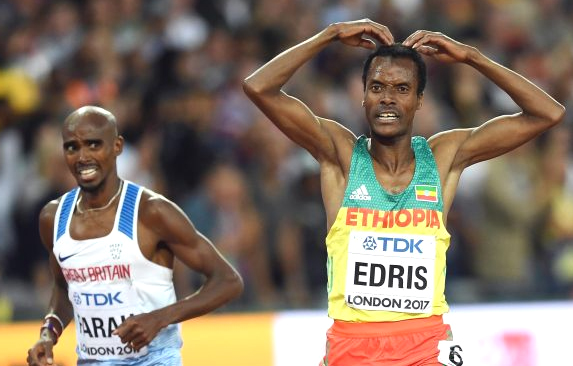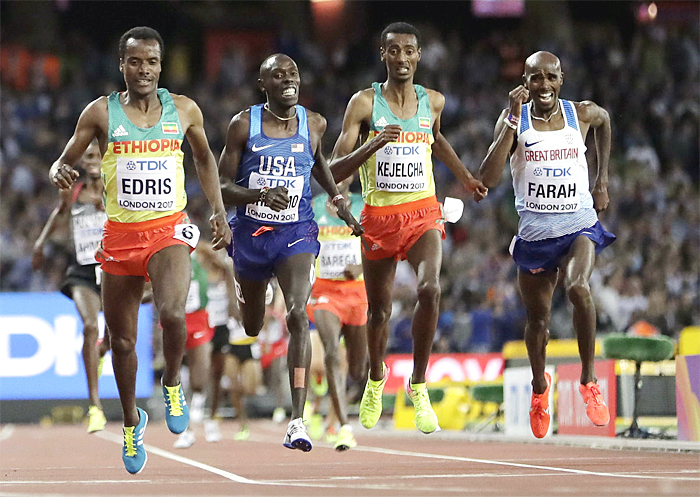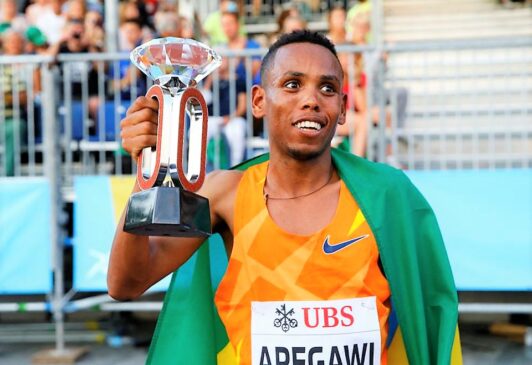Muktar Edris blazes to golden glory, spoils Mo Farah’s farewell party
By Zecharias Zelalem
 For the British public, the 5000m men’s final on day nine of the 2017 IAAF World Championships was always going to be perhaps the most emotional quarter hour of competition during the entire ten day sporting festival. It would be the last time Sir Mo Farah, the four time Olympic champion would lace up for a race on the track. At home and in front of an adoring public, Farah sought to repeat what he did at this same venue five years ago and win the double of the men’s 10k and 5k races. However on his big sendoff, things wouldn’t go according to script.
For the British public, the 5000m men’s final on day nine of the 2017 IAAF World Championships was always going to be perhaps the most emotional quarter hour of competition during the entire ten day sporting festival. It would be the last time Sir Mo Farah, the four time Olympic champion would lace up for a race on the track. At home and in front of an adoring public, Farah sought to repeat what he did at this same venue five years ago and win the double of the men’s 10k and 5k races. However on his big sendoff, things wouldn’t go according to script.
A trio of Ethiopian runners represented by Selemon Barega, Muktar Edris and Yomif Kejelcha were in town to spoil the party. And spoil the party they did. A perfectly executed array of team moves appear to have depleted the heavily favoured six time world champion and in the end, Muktar Edris ran away with the race winning gold, while Mo Farah had to settle for silver. It is his first loss at a World Championships since Ibrahim Jeilan upended him in the 10,000m final at the World’s in Daegu back in 2011.
Muktar Edris survived challenges from his teammate Yomif Kejelcha as well as late surges from American Paul Chelimo and Mo Farah. But while the three battled to the end for podium finishes, Muktar Edris, who hails from Ethiopia’s Silte zone, was strides ahead of the other three and finished as the clear cut winner. A clearly elated Muktar crossed the finish line and celebrated by mimicking Mo Farah’s trademark “Mo-bot” celebration, which some viewed as a gesture mocking the British athletics legend. But a little after Mo Farah fell to the track, devastated at having disappointed the home crowd, the newly crowned World Champion, recognizing the stature of the man he had just defeated, walked over and helped him up, embraced him before offering some words of consolation. In a scene reminiscent to the embrace between the dethroned Usain Bolt and the new 100m World Championship gold medalist American Justin Gatlin, Muktar Edris won plaudits not only for his excellent gold medal winning final lap but also for his sportsmanship. It has sparked a night of celebration amongst Ethiopians who are commemorating the country’s breaking out from Farah’s shadow after some six years of the Somali born athlete’s domination of long distance running.
For Ethiopian athletics fans, it had been a tough couple of days. Stuck on the sole gold medal won by Almaz Ayana last week in the women’s 10,000m race, heavily favoured Genzebe Dibaba’s finishing way off the 1,500m podium in last place was a massive disappointment and a blow to Ethiopia’s medal aspirations. In the subsequent men’s and women’s 3000m steeplechase races, Ethiopian athletes failed to medal, and in the men’s 1,500m event, the Ethiopian contingent failed to even reach the final. It was a depressing run of days leading up to the much awaited 5000m final.
HOPE
The three Ethiopian athletes who would put up the eventually successful bid to dethrone Mo Farah in the 5000m had each escaped their heats convincingly. Hagos Gebrhiwot, 2016 Diamond League winner and Rio Olympic bronze medalist was unable to compete due to injury, leaving Ethiopia one competent accomplished runner down. Nevertheless, Muktar Edris had obtained his personal best time in 2017 and is the fastest this year, while the tall Yomif Kejelcha had developed into a world beater, leading the standings in the Diamond League. Selemon Barega’s standout performances at the World U-18’s in Nairobi meant that the three inspired faint hope among Ethiopians that an upset could be on the cards.
A day before the race, IAAF chief Sebastian Coe penned an article in which he said among other things that “he couldn’t see Farah losing in the 5000m final.” But despite his being the crowd favourite and his last losing in the final of a major international 5000m race way back in 2009, he must have known deep down that this race would be a much harder one than the 10,000m final last week that saw him romp to victory. For one thing, the lingering effects of that race as well as the 5,000m semifinal would certainly start to weigh him down a bit, and secondly, the field of competitors that would await him in this final promised to be much more challenging than those he took on a week ago.
 Ethiopian social media was amass with videos of the last time Mo Farah had lost on the track. A nail biter saw him overtaken at the death by Ethiopia’s Ibrahim Jeilan in the 10,000m final at Daegu 2011. A bittersweet sensation of sorts, as some social media users preferred to reminisce in the victory earned some six years ago now, perhaps lacking the belief that the three Ethiopians could muster anything that could tame the Olympic champion on his home turf.
Ethiopian social media was amass with videos of the last time Mo Farah had lost on the track. A nail biter saw him overtaken at the death by Ethiopia’s Ibrahim Jeilan in the 10,000m final at Daegu 2011. A bittersweet sensation of sorts, as some social media users preferred to reminisce in the victory earned some six years ago now, perhaps lacking the belief that the three Ethiopians could muster anything that could tame the Olympic champion on his home turf.
The race proceeded, with the trio of Ethiopians and Mo Farah running in close proximity of each other. In a race traditionally dominated by teams from Ethiopia and Kenya who tend to start slowly and finish strongly, the sole Kenyan runner in the final Cyrul Rutto broke out at a frenetic pace and led the way before being caught up. He would later drift out and finish in thirteenth. For Kenya, today’s was the country’s worst ever performance in a World Championship 5000m final.
Kenyan born American Paul Chelimo had provoked the ire of the London crowd as he made what appeared to be the “Mo-bot” pose followed by a throat slitting gesture before the start of the race as the announcer was reading the names of the athletes. His eagerness to put an end to Farah’s reign was clear and he ran at the helm for most of the race, trading the lead with Farah, Muktar with the likes of Somali born Canadian runner Mohammed Ahmed and Yomif Kejelcha just behind them. Things wouldn’t break away from a “jog in the park” pace for much of the race. Although as we’ve seen time and time again, a slow paced race is where Mo Farah thrives. His ability to suddenly click into high gear and expend his reserves at the crucial moment before anyone else has a chance to react has seen him collect gold medal after gold medal, world title after world title.
It’s now evident that the Ethiopian coaching staff had done their homework. The three pronged attack started with the U-18 World Champion and African Junior champion Selemon Barega suddenly emerging from behind everyone into the lead. With some eight laps to go, the seventeen year old upped the ante and the pace, forcing everyone back to alertness after a snail paced start to the race. It appeared to be an attempt to drain some of the front runners, it ended up enticing Australian runner Patrick Tiernan to give it everything he had and go to the front. He took the bait and led the way for some time. But none seemed concerned about Tiernan’s sudden lead, he wasn’t the adversary everyone was waiting for and with a plethora of runners from East African or of East African descent bearing down on him, he was way past his wit’s end. He eventually finished eleventh. Whilst tailing Tiernan, Selemon Barega appeared to attempt to perhaps break Mo Farah’s concentration by running very close to him. At around 9:02 Mo Farah appeared to shove Selemon away from him.
Eventually, Tiernan was swallowed up by the pack of leading runners and with six hundred meters to go, Mo Farah led the way and appeared to be in poll position for world championship gold medal number seven. But the lanky Ethiopian Yomif Kejelcha decided to show his intentions and retook the lead just prior to the sounding of the bell. A brief glance to his left and he saw that his teammate Muktar Edris was starting to accelerate towards the front. Selemon Barega was also nearby, trapping Mo Farah in the midst of the three Ethiopian runners with no escape route in sight.
Bearing down on the world championship title, Yomif made a mad dash for the gold whilst simultaneously blocking the path of Mo Farah who was now boxed into the inner track. Farah managed to shake off Selemon’s challenge with two hundred meters to go, but was some distance off of catching the leading Ethiopian duo of Yomif and Muktar. To make matters worse, Chelimo the American Olympic silver medalist at Rio came flying out of nowhere to block off the outside route around Muktar and Yomif. With some fifty meters to go, an opening on the inner track developed and Yomif, who had successfully managed to hold off Mo Farah was passed by both the Brit and the American. But the two had no answer for Muktar Edris’ sudden injection of pace. The Ethiopian bolted away and was unsurpassable, clocking his finish at 13:32.79. Muktar Edris may have won the gold medal, but his two Ethiopian teammates clearly had a hand in his coronation in London. The last lap heroics of Yomif Kejelcha may have taken out the sting in Mo Farah’s routine finishing drive that has always proven too deadly for his opponents over the course of the past six years. It was silver for Mo Farah who came in at 13:33.22 and bronze for Paul Chelimo (13:33.30). Yomif Kejelcha put up a great fight only just missing the podium in fourth, while Selemon Barega finished fifth. Canada’s Mohammed Aman finished sixth ahead of seventh place Aron Kifle of Eritrea and Mo Farah’s British teammate, Andrew Butchart, who came in eighth.
Muktar Edris and his teammates celebrated Ethiopia’s second gold medal at these World Championships and this one would be a huge one. It is the first time Mo Farah failed to win a World’s 5000m title since he finished seventh at Berlin 2009 behind the race’s winner, legendary Ethiopian Kenenisa Bekele. It was the first gold medal won by an Ethiopian male athlete at a World’s since Mohammed Aman’s 800m triumph at Moscow 2013. It’s Mo Farah’s first defeat in a major international final since losing out to Ibrahim Jeilan in 2011, and it’s also to an Ethiopian. As the world saw the Usain Bolt era come to a catastrophic end with his losing in the 100m final and his limping out of the 4×100 relay later that evening, Mo Farah’s second place finish is another reminder that all good things must come to an end. Two giants of track and field saw their twin dominance ended at London 2017, the venue for some of their most spectacular victories only five years ago.
Mo Farah was classy in defeat. “The better man won,” is how he put it. But when asked to go into specifics, he told a reporter for the website Letsrun.com that the Ethiopian team tactics are what eventually finished him.
 “It was three against one and they had to sacrifice one of them, they sacrificed Kejelcha not to get a medal and Edris to sit on the back and to do as less work as possible and to come beat me on their last lap and that was their plan. As an athlete, what you want to do when you get in them races, you want to cover every move. I spend, looking back, I spent quite a lot of energy just trying to cover moves and trying to make sure I’m in the right place and then the last lap [I’m] boxed in a little bit.”
“It was three against one and they had to sacrifice one of them, they sacrificed Kejelcha not to get a medal and Edris to sit on the back and to do as less work as possible and to come beat me on their last lap and that was their plan. As an athlete, what you want to do when you get in them races, you want to cover every move. I spend, looking back, I spent quite a lot of energy just trying to cover moves and trying to make sure I’m in the right place and then the last lap [I’m] boxed in a little bit.”
Muktar had a chat with Ethiopian journalists afterwards and explained that he and his teammates did indeed discuss plans on how to contain and eventually beat Farah, but denied that there was a plan to “sacrifice” anyone.
“We entered the race with a plan but we didn’t want to complicate things from the start of the race. Our plan was mostly centered on how to finish. We agreed on this and things went according to plan. The plan was to ensure one of us three would win it with our finishing and yes, our plan worked, we have succeeded.”
Muktar then said remarked that he had taken note of Mo Farah’s remaining in the lead for much of the race.
“I was happy when I saw that he wanted to remain ahead of us. He normally stays in the back and then starts to push up front later in the race. But he decided to stay in the lead and this made it easier for me to track him throughout the race. I felt more optimistic when I saw him just ahead of me.”
“I love you from the bottom of my heart! Thank you, thank you all!”
This he addressed to Ethiopians all across the country who were following the heart stopping race.
For Ethiopian athletics fans, this colossal win will most likely put Muktar Edris’ name alongside the country’s all time greats. Starved of gold in this event for eight years, Muktar ended the dry spell that dated back to the days where Haile Gebreselassie and Kenenisa Bekele reigned supreme. There is hope that with Muktar Edris in the prime of his career, and his younger prodigious teammates in Yomif Kejelcha and Selemon Barega attaining world class caliber at such a tender age, the dominance of long distance events will shift back to the East African nation.
The gold medal has hauled Ethiopia back into the top ten of the medal standings, tied for fourth with host nation Great Britain and second in Africa behind Kenya.



